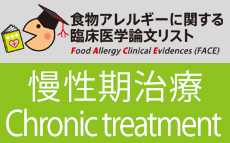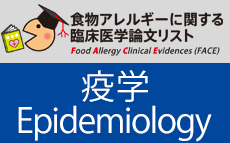牛乳アレルギーに対する経口免疫療法/Oral immunotherapy for milk allergy.
更新日:2016年10月21日
| Author: | Yeung JP, Kloda LA, McDevitt J, Ben-Shoshan M, Alizadehfar R. |
|---|---|
| Title: | Oral immunotherapy for milk allergy. |
| Citation: | Cochrane Database of Systematic Reviews 2012, Issue 11. Art. No.: CD009542 |
| URL: | https://pubmed.ncbi.nlm.nih.gov/23152278/ |
| Abstract: | BACKGROUND: The mainstay of treatment of IgE-mediated cow milk allergy (IMCMA) is an avoidance diet, which is especially difficult with a ubiquitous food like milk. Milk oral immunotherapy (MOIT) may be an alternative treatment, through desensitization or induction of tolerance. OBJECTIVES: We aim to assess the clinical efficacy and safety of MOIT in children and adults with IMCMA as compared to a placebo treatment or avoidance strategy. SEARCH METHODS: We searched 13 databases for journal articles, conference proceedings, theses and unpublished trials, without language or date restrictions, using a combination of subject headings and text words. The search is up-to-date as of October 1, 2012. SELECTION CRITERIA: Only randomised controlled trials (RCT) were considered for inclusion. Blinded and open trial designs were included. Children and adults with IMCMA were included. MOIT administered by any protocol were included. DATA COLLECTION AND ANALYSIS: A total of 2111 unique records were identified and screened for potential inclusion. Studies were selected, data extracted and methodological quality assessed independently by two reviewers. We attempted to contact the study investigators to inquire about data not published that was required for the analysis. Statistical heterogeneity was assessed using the I² test. We estimated a pooled risk ratio (RR) for each outcome using a Mantel-Haenzel fixed-effect model if statistical heterogeneity was low as evaluated by an I² value less than 50%. MAIN RESULTS: Of 157 records reviewed, 16 were included, representing five trials. In general, the studies were small and had inconsistent methodological rigor. Overall, the quality of evidence was rated as low. Each study used a different MOIT protocol. A total of 196 patients were studied (106 MOIT, 90 control) and all were children. Three studies were blinded and two used an avoidance diet control. Sixty-six patients (62%) in the MOIT group were able to tolerate a full serving of milk (about 200 mL) compared to seven (8%) of the control group (RR 6.61, 95% CI 3.51 to 12.44). In addition, 27 (25%) in the MOIT group could ingest a partial serving of milk (10 to 184 mL) while none could in the control group (RR 9.34, 95% CI 2.72 to 32.09). None of the studies assessed the patients following a period off immunotherapy. Adverse reactions were common (97 of 106 MOIT patients had at least one symptom), although most were local and mild. Because of variability in reporting methods, adverse effects could not be combined quantitatively. For every 11 patients receiving MOIT, one required intramuscular epinephrine. One patient required it on two occasions. AUTHORS' CONCLUSIONS: Studies to date have involved small numbers of patients and the quality of evidence is generally low. The current evidence shows that MOIT can lead to desensitization in the majority of individuals with IMCMA although the development of long-term tolerance has not been established. A major drawback of MOIT is the frequency of adverse effects, although most are mild and self-limited. The use of parenteral epinephrine is not infrequent. Because there are no standardized protocols, guidelines would be required prior to incorporating desensitization into clinical practice. |
| 邦文タイトル: | 牛乳アレルギーに対する経口免疫療法 |
| 一般向け要約 | IgE関連牛乳アレルギー(IMCMA)の治療の柱は除去食であるが、牛乳は様々な食材に含有している。牛乳の経口免疫療法(MOIT)は減感作または寛容導入を目標とした代替治療ともいえる。IMCMAの小児または成人のMOITの臨床効果と安全性について検討した。13のデータベースから2012年10月までのランダム化比較試験の16論文が検索された。すべてMOITの方法は異なり、計196名の患者(106人のMOIT群と90人の対照群)は全例小児であった。MOIT群のうち66人(62%)は牛乳が十分(約200ml)摂取できるようになった。それに加えてMOIT群のうち27人(25%)は牛乳がある程度(10-184ml)摂取できるようになっていた。経過中MOIT患者のうち97例は何らかの副作用がみられたが、いずれも局所症状にとどまり軽症であった。MOIT群でエピネフリンの筋注を行った例はMOIT患者11人に対して1人の割合であった。 患者数は少なくエビデンスの質も低かった。しかし長期的な耐性獲得については確立されていないものの、MOITにより多くのIMCMA患者が脱感作に至ることができたことがわかった。ほとんどの例が軽度ではあるが、MOITの大きな欠点は副作用の頻度が多いことである。エピネフリンの使用がまれとはいえない。標準化されたプロトコールがないため、免疫療法を臨床応用する前にガイドラインの作成が必要である。 |
| 専門医コメント | 牛乳アレルギーに対しても経口免疫療法(少しずつアレルギー食品を摂取していく治療法)が多くの専門施設で行われるようになってきています。しかし重症食物アレルギーの患者にとって、アレルゲンを日常生活の中で摂取していくのはリスクと背中合わせの状態とも言えます。世界で明確な免疫療法のプロトコールやガイドライン作成が望まれています。 |


